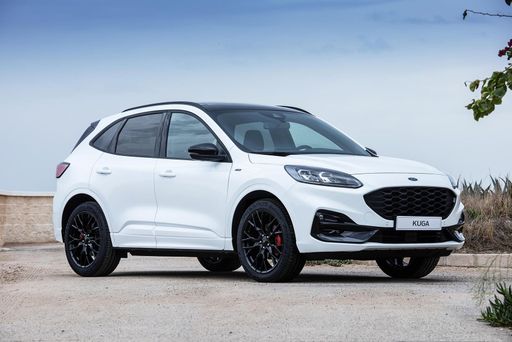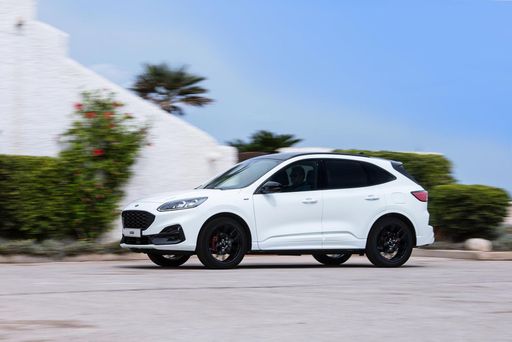Ford Kuga vs Toyota C-HR - Differences and prices compared
Compare performance (243 HP vs 223 HP), boot space and price (34200 £ vs 29100 £ ) at a glance. Find out which car is the better choice for you – Ford Kuga or Toyota C-HR?
Costs and Efficiency:
When it comes to price and running costs, the biggest differences usually appear. This is often where you see which car fits your budget better in the long run.
Toyota C-HR has a somewhat advantage in terms of price – it starts at 29100 £ , while the Ford Kuga costs 34200 £ . That’s a price difference of around 5108 £.
Fuel consumption also shows a difference: Toyota C-HR manages with 0.80 L and is therefore clearly more efficient than the Ford Kuga with 2.80 L. The difference is about 2 L per 100 km.
The electric range is almost identical – both manage about 68 km on a single charge.
Engine and Performance:
Under the bonnet, it becomes clear which model is tuned for sportiness and which one takes the lead when you hit the accelerator.
When it comes to engine power, the Ford Kuga has a hardly perceptible edge – offering 243 HP compared to 223 HP. That’s roughly 20 HP more horsepower.
In acceleration from 0 to 100 km/h, the Ford Kuga is barely noticeable quicker – completing the sprint in 7.30 s, while the Toyota C-HR takes 7.40 s. That’s about 0.10 s faster.
In terms of top speed, the Ford Kuga performs barely noticeable better – reaching 200 km/h, while the Toyota C-HR tops out at 180 km/h. The difference is around 20 km/h.
Space and Everyday Use:
Cabin size, boot volume and payload all play a role in everyday practicality. Here, comfort and flexibility make the difference.
Both vehicles offer seating for 5 people.
In curb weight, Toyota C-HR is minimal lighter – 1505 kg compared to 1526 kg. The difference is around 21 kg.
In terms of boot space, the Toyota C-HR offers minimal more room – 447 L compared to 412 L. That’s a difference of about 35 L.
In maximum load capacity, the Ford Kuga performs evident better – up to 1534 L, which is about 379 L more than the Toyota C-HR.
When it comes to payload, Ford Kuga clearly perceptible takes the win – 550 kg compared to 425 kg. That’s a difference of about 125 kg.
Who wins the race?
The Toyota C-HR proves to be leaves the rival little chance and therefore becomes our DriveDuel Champion!
Toyota C-HR is the better all-rounder in this comparison.

Toyota C-HR
Costs and Consumption
View detailed analysis
Engine and Performance
View detailed analysis
Dimensions and Body
View detailed analysis
Ford Kuga
The Kuga is Ford’s adaptable family SUV that blends usable space with a surprisingly lively driving character, making daily commutes and weekend escapes equally enjoyable. With smart interior packaging, an easy-to-use infotainment setup and composed road manners, it’s a sensible choice for buyers who want a bit of fun without the fuss.
details


Toyota C-HR
The Toyota C-HR cuts a striking figure with its angular styling and coupe-like profile, so you’ll never go unnoticed in the supermarket car park. It balances everyday practicality with a nimble, city-friendly personality, making routine commutes feel a touch more fun without asking for forgiveness.
details




Costs and Consumption |
|
|---|---|
|
Price
34200 - 46300 £
|
Price
29100 - 42800 £
|
|
Consumption L/100km
2.8 - 6.8 L
|
Consumption L/100km
0.8 - 5.1 L
|
|
Consumption kWh/100km
-
|
Consumption kWh/100km
-
|
|
Electric Range
68 km
|
Electric Range
68 km
|
|
Battery Capacity
1.1 - 14.4 kWh
|
Battery Capacity
-
|
|
co2
55 - 154 g/km
|
co2
17 - 115 g/km
|
|
Fuel tank capacity
42 - 54 L
|
Fuel tank capacity
43 L
|
Dimensions and Body |
|
|---|---|
|
Body Type
SUV
|
Body Type
SUV
|
|
Seats
5
|
Seats
5
|
|
Doors
5
|
Doors
5
|
|
Curb weight
1526 - 1859 kg
|
Curb weight
1505 - 1755 kg
|
|
Trunk capacity
412 L
|
Trunk capacity
350 - 447 L
|
|
Length
4604 - 4645 mm
|
Length
4362 mm
|
|
Width
1882 mm
|
Width
1832 mm
|
|
Height
1673 - 1681 mm
|
Height
1558 - 1564 mm
|
|
Max trunk capacity
1534 L
|
Max trunk capacity
1076 - 1155 L
|
|
Payload
541 - 550 kg
|
Payload
375 - 425 kg
|
Engine and Performance |
|
|---|---|
|
Engine Type
Petrol, Full Hybrid, Plugin Hybrid
|
Engine Type
Full Hybrid, Plugin Hybrid
|
|
Transmission
Manuel, Automatic
|
Transmission
Automatic
|
|
Transmission Detail
Manual Gearbox, CVT, Automatic Gearbox
|
Transmission Detail
CVT
|
|
Drive Type
Front-Wheel Drive, All-Wheel Drive
|
Drive Type
Front-Wheel Drive, All-Wheel Drive
|
|
Power HP
150 - 243 HP
|
Power HP
140 - 223 HP
|
|
Acceleration 0-100km/h
7.3 - 9.9 s
|
Acceleration 0-100km/h
7.4 - 9.9 s
|
|
Max Speed
195 - 200 km/h
|
Max Speed
175 - 180 km/h
|
|
Torque
240 Nm
|
Torque
-
|
|
Number of Cylinders
3 - 4
|
Number of Cylinders
4
|
|
Power kW
111 - 178 kW
|
Power kW
103 - 164 kW
|
|
Engine capacity
1496 - 2488 cm3
|
Engine capacity
1798 - 1987 cm3
|
General |
|
|---|---|
|
Model Year
2025
|
Model Year
2024 - 2025
|
|
CO2 Efficiency Class
E, D, B
|
CO2 Efficiency Class
C, B
|
|
Brand
Ford
|
Brand
Toyota
|
What drivetrain options does the Ford Kuga have?
The Ford Kuga is available as Front-Wheel Drive or All-Wheel Drive.




